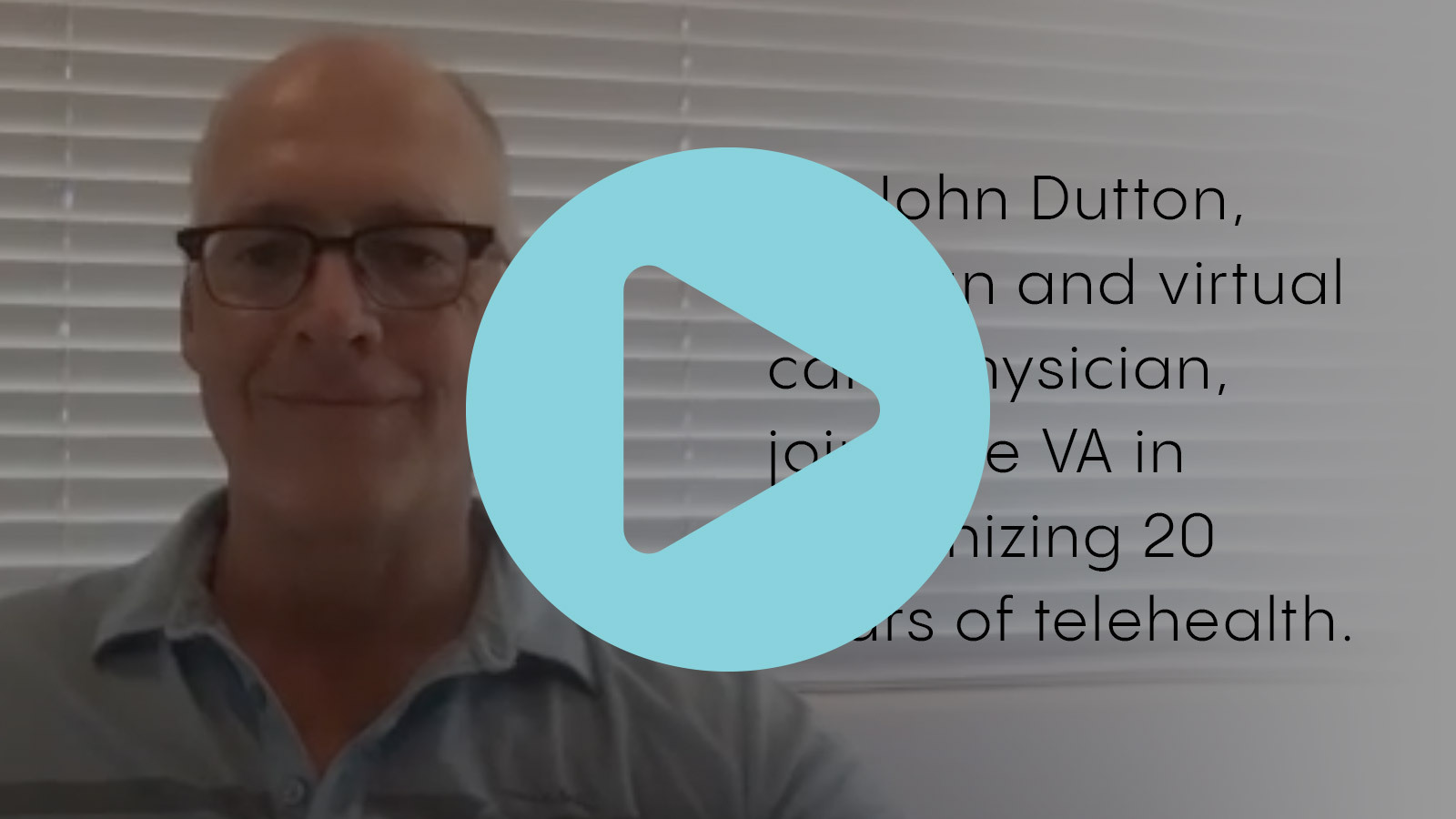Q: The VA recently recognized their 20 year anniversary of providing telehealth services. Can you talk about what telehealth means to Veteran care?
A: Absolutely. The VA is a large and complicated entity that provides wonderful care for our Veterans, who need and deserve the best care. The challenge can often be getting that care, whether it's traveling to a clinic or getting through the process of completing VA assignments to enter the care system. Anything we can do to improve that is a huge benefit for the Veterans.
Telemedicine is one of the tools the VA has made available to help Veterans reach people who can help them get easier access to care. There are a lot of Veterans who can't travel, have difficulty with transportation, or have chronic medical issues related to their time served in the military. They shouldn't lack care because they can't get to an in-person point of care. Telemedicine allows them to get care where they are — so important for Veterans.
Q: You have unique experience as a physician, a veteran and a virtual care doctor. Share your perspective as someone who touches each of these three categories.
A: As a physician, I have a unique perspective on what the medical system is like, and how to best navigate it. But even with my experience, it’s difficult.
I’m a disabled Veteran, so I get a large part of my care through the VA system. Once I initially got to my primary care doctor, it was fantastic. As a physician, I'm able to interact with my providers. But getting there was challenging, and as a telemedicine doctor, I realized how important it is for any Veteran to be able to speak quickly to physician or physician extender and get care, or even get guidance about where to get care.
For Veterans, it’s not always just getting your problem solved. Sometimes it's figuring out — do I have a problem? Who is the best person to see? Telemedicine really streamlines that process. You don't wait four weeks to see your doctor because your leg hurts, then get to the doctor to find it's actually a joint injury, and you need to see an orthopedist instead. There’s so much that can happen in those four weeks that a patient may be waiting. With telemedicine, you have fast interaction and quickly break through barriers to get to the right place quickly.
Q: What are some of the factors that make healthcare so challenging for Veterans?
A: The VA system is so large and complex. It can be really difficult for Veterans to get set up, find out who their doctor is and where they should be getting care. It’s also very centralized, so often Veterans have to travel to a base that provides care.
The model works well to bring everyone together, so a Veteran can see a doctor, have a procedure, get everything in the same place. But not everyone lives near a base, so it can be difficult to get to those services on a regular basis. Often a Veteran will spend the whole day on a base, going from doctor to doctor, because it’s the best way to get it all done. But if a Veteran can't get that set up, it can fractionate care. Again, telemedicine can help cut through those barriers.
Q: The VA Health system is remarkable, and yet, you’ve mentioned it can be difficult to navigate. What are some of the ways that telehealth can help?
A: The VA has definitely improved their website and web services, which is great for Veterans. Having telemedicine upfront, where a Veteran can log in and can see available care options is really important. It’s easier access to find anything they might need — and again, reducing barriers to care is huge.
When a person isn’t feeling well and trying to get care, it can be so frustrating. Sometimes people just give up and say “I’ll just deal with it.” And that’s not the right answer, because conditions can worsen. Increasing digital capabilities, improving transportation and increasing access to care really helps patients.
Q: Is there a specific care experience you’ve had with a Veteran that you can share?
A: I’ve cared for Veterans with chronic issues over the years. Recently I had a Veteran with swelling in his leg. We texted back and forth, and he took some pictures. I realized he had an infection in his leg. We then needed to determine if there was a VA doctor that he was actively working with, and he wasn't sure. So I was able to give him resources to help and help him set up an appointment to be seen through the VA, at a more urgent area where he could be seen, evaluated, and taken care of.
If he hadn't had a telemedicine option, his infection could have become severe and he could have ended up in the hospital, or worse, he could have become septic.
Telemedicine got him care 24 hours or 48 hours sooner, got him antibiotics, and the in-person care he needed. It was great news, because he went home and recovered just fine. That’s a big win. His health was in jeopardy and there were potential costs that could have been astronomical.
Q: As we think about the advances in virtual care and the need to deliver great care to our Veterans, what might the next 20 years have in store?
A: There is a legacy of telemedicine providers who use video services only. A doctor can only see one patient at a time. Now we’re moving into more asynchronous services that allow a doctor to see multiple patients at once, which gets Veterans faster care. Wait times are shorter, virtual and in-person waiting room time is reduced or eliminated.
We don’t want people who need care to give up. Getting to care quickly and reducing barriers is an important advancement. People are used to getting things fast now; they don’t want to wait. So the physician network at CirrusMD is expanding our services across telemedicine lines. We're ordering and monitoring labs, following blood pressures, looking at people with asthma and lung disease. We can virtually monitor and manage patients long term. Virtual care is driving big improvements in chronic care.
I believe we’ll see even greater expansion of virtual services. Of course there are times everyone needs to be seen in person. That's super important. You just don't need to be seen in person every time.
Q: What do you want people to know about telemedicine and delivering care to Veterans?
A: We’ve had 20 years of telemedicine and just finished the longest war in US history, also 20 years. And with that comes Veterans and disabled Veterans who need care.
More than ever, we have our aging Veteran population from Vietnam, Korea, Operation Enduring Freedom, and the first Iraq war. Those patients need more and more care, which is driving a big influx into the system. Telemedicine is a huge part of taking care of those patients well.









